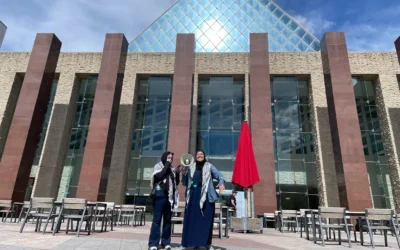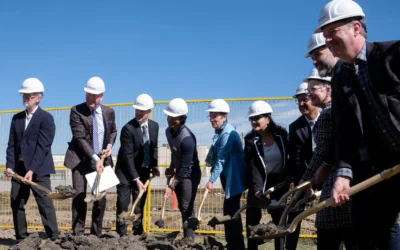Whether in a job interview, by your high school’s guidance counselor, or by a job recruiter on campus, at some point everyone has been asked: “where do you see yourself in five years? ”
“I always struggled with that question,” says Jeremy Klaszus, founder and editor-in-chief of The Sprawl. “I don’t know why — I guess I’m a very in-the-moment person.”
It was just four years ago that Klaszus founded The Sprawl, a local news website in Calgary, ahead of the city’s 2017 municipal elections. At the time, it was what he calls a “zany experiment.” In February of this year, The Sprawl announced it had grown large enough to warrant an expansion into Edmonton — essentially doubling the scope of its coverage.
Prior to The Sprawl, Klaszus had been working as a freelance journalist in Calgary for years, writing for CBC, StarMetro, a Calgary alt-weekly newspaper called Fast Forward Weekly, and many other outlets. In 2015, Fast Forward announced it would be publishing its last issue, and Klaszus says that, around this time, things were not looking up for local journalism.
“Freelance budgets were constantly being cut. At the same time, newsroom jobs were being kept,” he says. “I was just looking around that summer and thinking, ‘this is not good.’”
The problem wasn’t just a lack of jobs. Declining newsrooms around this time were in part the result of mergers between large newspaper companies in which mostly smaller newsrooms were closed or downsized — such as when Postmedia Network Inc. and Torstar Corp. swapped 37 community newspapers in 2017, after which most closed. This, combined with Calgary’s premier alt-weekly closing, left journalism in the city lacking for both coverage and diversity of voices — as it tends to do Klaszus says.
“There were quite a number of people who went to Fast Forward for their news. And once it was gone, there was this hole,” Klaszus says.
As a partial solution, he came up with the idea of doing an experiment in “pop-up journalism”: The Sprawl would cover just one issue at a time, giving each one a very in-depth look with multiple articles.
Klaszus set up a page for The Sprawl on Patreon, a crowd funding platform where users support projects with regular, monthly donations. People could subscribe if they wanted to support The Sprawl, but all of the content would be available for free.
The first edition, naturally, covered the Calgary municipal election. Klaszus wasn’t expecting much, but says that in the single month between September 2017 when the website launched and election day in October, his coverage received so much attention, and the Patreon page so much support, that picking another issue to cover was barely even a question.
The Sprawl had readers vote on what the website would cover next. It was decided that the second pop-up edition would cover Calgary’s city budget in November of 2017. In early 2018, The Sprawl moved on to the city’s controversial bid to host the 2026 Winter Olympics. With each edition, Klaszus says the website received more and more attention.
“It was surprising, especially early on,” he says. “It goes to show that there was a hunger — that people weren’t satisfied by the news outlets that were in town and they were looking for some thing else, or something more.”
Since then, The Sprawl has evolved way beyond the pop-up model. While Klaszus says in the early days almost all the reporting, writing, and editing was done by just him, now the website employs another editor and a whole team of reporters, and supplies paying jobs to a small collection of freelancers on top. Its podcast, called the Sprawlcast, launched in 2018, as did its own membership program that allowed people to contribute monthly donations without having to use Patreon. The website now resembles a more conventional local news site with regularly posted news and opinion articles on a variety of topics. The focus is still on Calgary politics, with occasional coverage of provincial politics as well, and Klaszus says the approach will always be to go in-depth on a small number of issues at a time.
“We definitely don’t publish daily, ” he says. “We’re not trying to be first to the story. It’s about slowing things down, and really digging into the issues that matter to people.”
The Sprawl has also received a few awards. For its very first pop-up edition, the website won a 2018 Digital Publishing Award for best news coverage. It won again for general excellence in digital publishing in 2019, and was shortlisted for best news coverage in 2020. Also in 2020, The Sprawl was awarded $135,000 in grant funding from the Facebook Journalism Project, and $30,000 from the Canadian Periodical Fund, to help sustain their operations.
Klaszus says that, as the website grew, it started to receive attention from Edmonton, even though the news coverage was still mostly focused on Calgary.
“We were being asked about it by people who lived in Edmonton, and we had actually a number of Edmontonians who were signing up as Sprawl members, just by virtue of our small amount of provincial affairs coverage,” he says. “As we started doing more provincial coverage, people were asking more and more: ‘why don’t you come to Edmonton? ’”
In February, the website finally responded, announcing it was looking for a full-time deputy editor based in Edmonton, to set up a second newsroom and work with freelancers to cover Alberta’s second major city. The Sprawl’s management team started interviewing candidates in March, and hopes to have Edmonton operations up and running soon.
But, even as The Sprawl continuously expanded since launching in 2017, most of the rest of Canada’s newsrooms continued to shrink. In 2018, Edmonton’s alt-weekly and coun terpart to Calgary’s Fast Forward, VUE Weekly, published its last issue. In 2019, Torstar discontinued its StarMetro newspapers in Edmonton, Calgary, Vancouver, Toronto, and Halifax. In 2020, Postmedia shut down 15 of its smaller publications in communities around Manitoba and Ontario.
There are a couple probable reasons for The Sprawl’s startling success. One is the business model. The larger companies most commonly cite declining advertising revenues as the reason for shutting their publications down. The Sprawl doesn’t rely on advertisers. Many large news outlets have put some of their content behind a paywall, like The Globe and Mail, or only allowed readers to view a certain number of articles for free each day, like the Edmonton Journal. Evidence from the U.S. journalism industry suggests paywalls are ineffective at raising money, and impair the public service journalism is supposed to perform. The Sprawl doesn’t have a paywall — paid subscriptions are entirely voluntary.
Members can choose to pay $5, $10, or $20 monthly, and with this model, The Sprawl has attracted over 2,000 paying members. It may be counterintuitive that a voluntary model would seem ingly prove more financially successful than a mandatory paywall, but Klazsus says The Sprawl’s way of covering news is what makes it work, and is the real reason for its success.
“It’s quality over quantity,” he explains. “We take the time to ask: what should we dig into? What perspective can we bring that’s not being shared right now? By slowing the whole process down you can connect with your audience, and that really resonated.”
“If you ask: ‘do you need 10 more news articles to read today? ’ anyone will tell you ‘no, I’ve got way too much stuff to read. I’m drowning in information,’” he adds.
Just as Klaszus had no idea if The Sprawl would exist beyond the 2017 municipal election in Calgary, he does not know what’s in store next for The Sprawl. The evolution of the website up until this point, including the expansion into Edmonton, was just a natural response to what readers seemed to want, he says.
“It’s almost bizarre. I have to ask myself ‘how did this work? ’” he says, laughing. “It shouldn’t have worked, but somehow it does, so I’m going to just keep rolling with it.”
Images courtesy of Rob Moses Photography





0 Comments